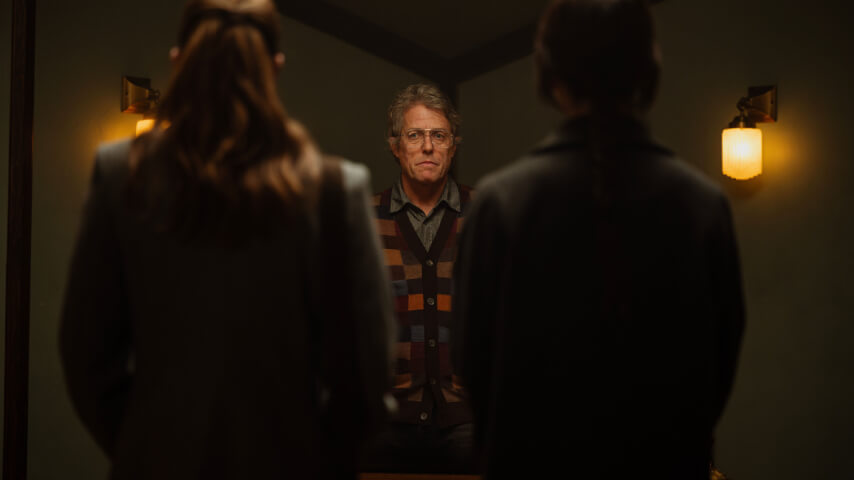The terrifically tense Heretic will make you believe in the power of Hugh Grant
Grant's faith-based villain steals the show in the latest horror from Scott Beck and Bryan Woods.
Photo: A24
When Scott Beck and Bryan Woods emerged to introduce Heretic at a Fantastic Fest secret screening, the writing and directing duo framed the film around a particular narrative challenge they’d set for themselves. Because Beck and Woods are most famous for writing A Quiet Place, a high-concept thriller with very little dialogue, they wanted to prove they could make a thriller that’s all about dialogue, the tension between characters, and the arguments they make when their lives might be on the line.
To meet this challenge, Beck and Woods chose arguably the most tense topic they could find, religion, and got Hugh Grant in the midst of his Villain Era (thanks, Paddington 2 and Dungeons & Dragons: Honor Among Thieves) to embody the most terrifying person in any religious sphere: a man who will not shut up about his convictions. It’s a recipe for setting an audience on edge, and the more it simmers, the more Heretic proves itself a compelling, inventive thriller driven by three great central performances.
Sophie Thatcher and Chloe East play two Mormon missionaries, Sisters Barnes and Paxton, respectively, out making their rounds as a storm blows into town. As rain begins to fall, they knock on the door of Mr. Reed (Grant), a pleasant older man who’d expressed interest in knowing more about the church. They’re not supposed to go inside without another woman present, for safety, but Mr. Reed is kind and encouraging—his wife’s just back in the kitchen making pie—and the storm is getting worse. So, the women enter, and a robust theological discussion begins. It’s interesting, if a bit awkward, but it turns terrifying when the girls realize that the “blueberry pie” they’ve been promised is actually a scented candle, and that Mr. Reed has no plans to give them an easy exit.
Beck and Woods’ desire to let the dialogue drive the tension is obvious from the beginning. Much of Heretic plays out with the tempo and tension of a three-hander stage play, as Thatcher, East, and Grant move through various rooms in Mr. Reed’s house, debating religious conviction and the origins of faith while also trying to puzzle out just what exactly this little game the old man is playing might really be about. Any film this laser-focused on religion—and the film touches on everything from Egyptian gods to the history of polygamy in the early Mormon church—runs the risk of being not just dry, but outright off-putting, and Beck and Woods are, blessedly, aware enough of this to keep the audience on its toes.

 Keep scrolling for more great stories from A.V. Club.
Keep scrolling for more great stories from A.V. Club.